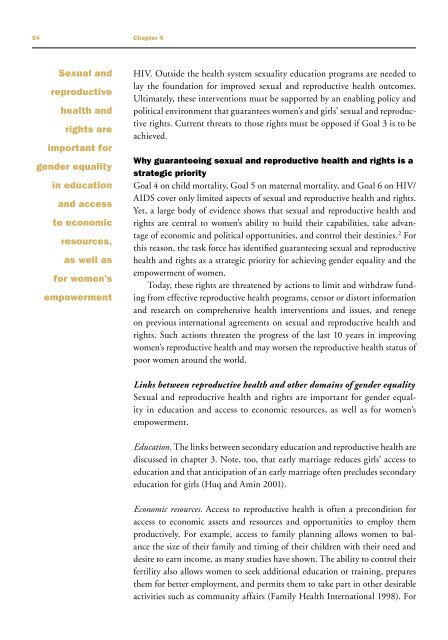Taking action: achieving gender equality and empowering women
Taking action: achieving gender equality and empowering women
Taking action: achieving gender equality and empowering women
You also want an ePaper? Increase the reach of your titles
YUMPU automatically turns print PDFs into web optimized ePapers that Google loves.
54 Chapter 4<br />
Sexual <strong>and</strong><br />
reproductive<br />
health <strong>and</strong><br />
rights are<br />
important for<br />
<strong>gender</strong> <strong>equality</strong><br />
in education<br />
<strong>and</strong> access<br />
to economic<br />
resources,<br />
as well as<br />
for <strong>women</strong>’s<br />
empowerment<br />
HIV. Outside the health system sexuality education programs are needed to<br />
lay the foundation for improved sexual <strong>and</strong> reproductive health outcomes.<br />
Ultimately, these interventions must be supported by an enabling policy <strong>and</strong><br />
political environment that guarantees <strong>women</strong>’s <strong>and</strong> girls’ sexual <strong>and</strong> reproductive<br />
rights. Current threats to those rights must be opposed if Goal 3 is to be<br />
achieved.<br />
Why guaranteeing sexual <strong>and</strong> reproductive health <strong>and</strong> rights is a<br />
strategic priority<br />
Goal 4 on child mortality, Goal 5 on maternal mortality, <strong>and</strong> Goal 6 on HIV/<br />
AIDS cover only limited aspects of sexual <strong>and</strong> reproductive health <strong>and</strong> rights.<br />
Yet, a large body of evidence shows that sexual <strong>and</strong> reproductive health <strong>and</strong><br />
rights are central to <strong>women</strong>’s ability to build their capabilities, take advantage<br />
of economic <strong>and</strong> political opportunities, <strong>and</strong> control their destinies. 2 For<br />
this reason, the task force has identified guaranteeing sexual <strong>and</strong> reproductive<br />
health <strong>and</strong> rights as a strategic priority for <strong>achieving</strong> <strong>gender</strong> <strong>equality</strong> <strong>and</strong> the<br />
empowerment of <strong>women</strong>.<br />
Today, these rights are threatened by <strong>action</strong>s to limit <strong>and</strong> withdraw funding<br />
from effective reproductive health programs, censor or distort information<br />
<strong>and</strong> research on comprehensive health interventions <strong>and</strong> issues, <strong>and</strong> renege<br />
on previous international agreements on sexual <strong>and</strong> reproductive health <strong>and</strong><br />
rights. Such <strong>action</strong>s threaten the progress of the last 10 years in improving<br />
<strong>women</strong>’s reproductive health <strong>and</strong> may worsen the reproductive health status of<br />
poor <strong>women</strong> around the world.<br />
Links between reproductive health <strong>and</strong> other domains of <strong>gender</strong> <strong>equality</strong><br />
Sexual <strong>and</strong> reproductive health <strong>and</strong> rights are important for <strong>gender</strong> <strong>equality</strong><br />
in education <strong>and</strong> access to economic resources, as well as for <strong>women</strong>’s<br />
empowerment.<br />
Education. The links between secondary education <strong>and</strong> reproductive health are<br />
discussed in chapter 3. Note, too, that early marriage reduces girls’ access to<br />
education <strong>and</strong> that anticipation of an early marriage often precludes secondary<br />
education for girls (Huq <strong>and</strong> Amin 2001).<br />
Economic resources. Access to reproductive health is often a precondition for<br />
access to economic assets <strong>and</strong> resources <strong>and</strong> opportunities to employ them<br />
productively. For example, access to family planning allows <strong>women</strong> to balance<br />
the size of their family <strong>and</strong> timing of their children with their need <strong>and</strong><br />
desire to earn income, as many studies have shown. The ability to control their<br />
fertility also allows <strong>women</strong> to seek additional education or training, prepares<br />
them for better employment, <strong>and</strong> permits them to take part in other desirable<br />
activities such as community affairs (Family Health International 1998). For

















